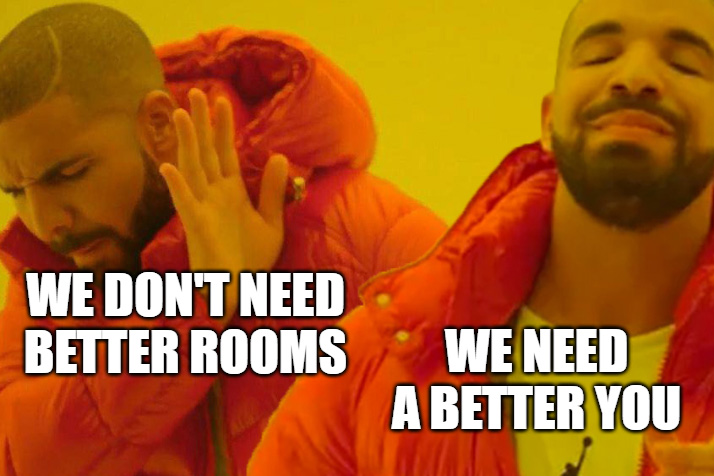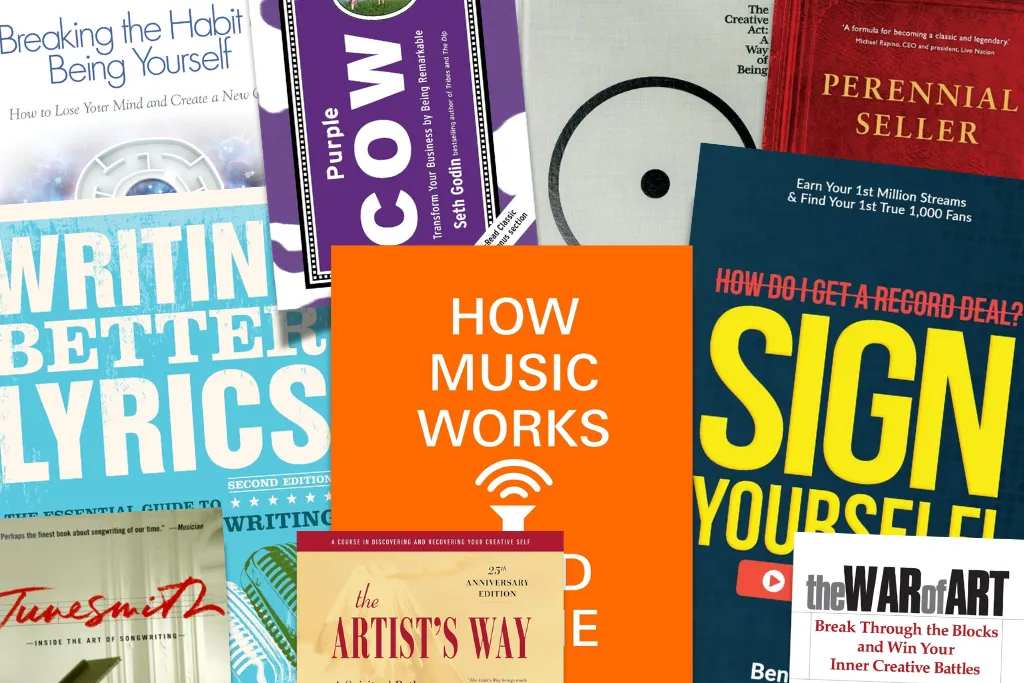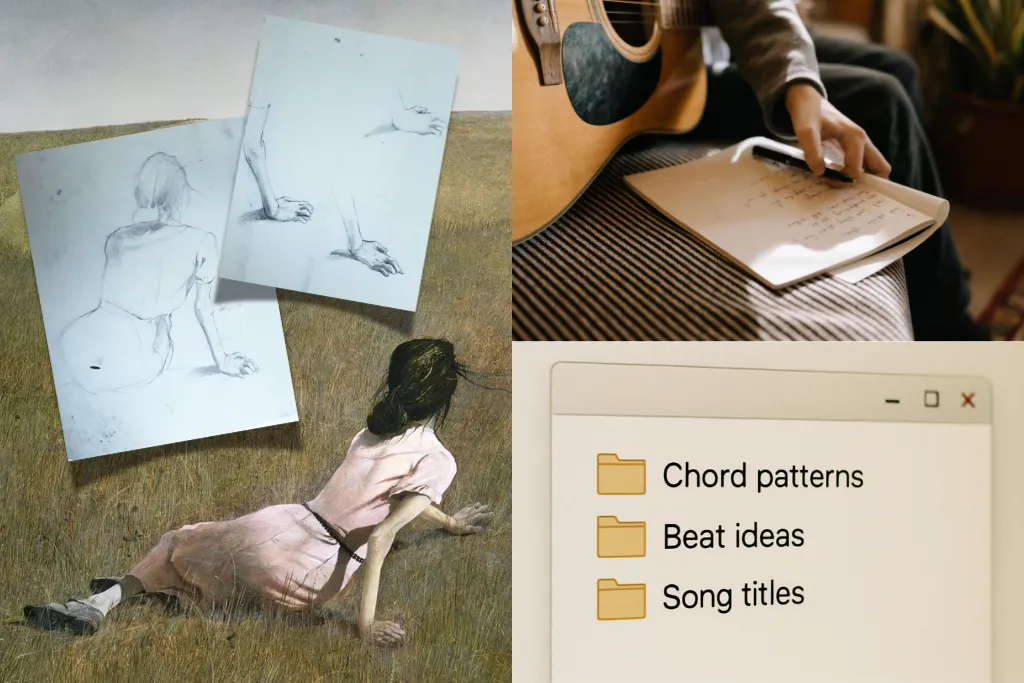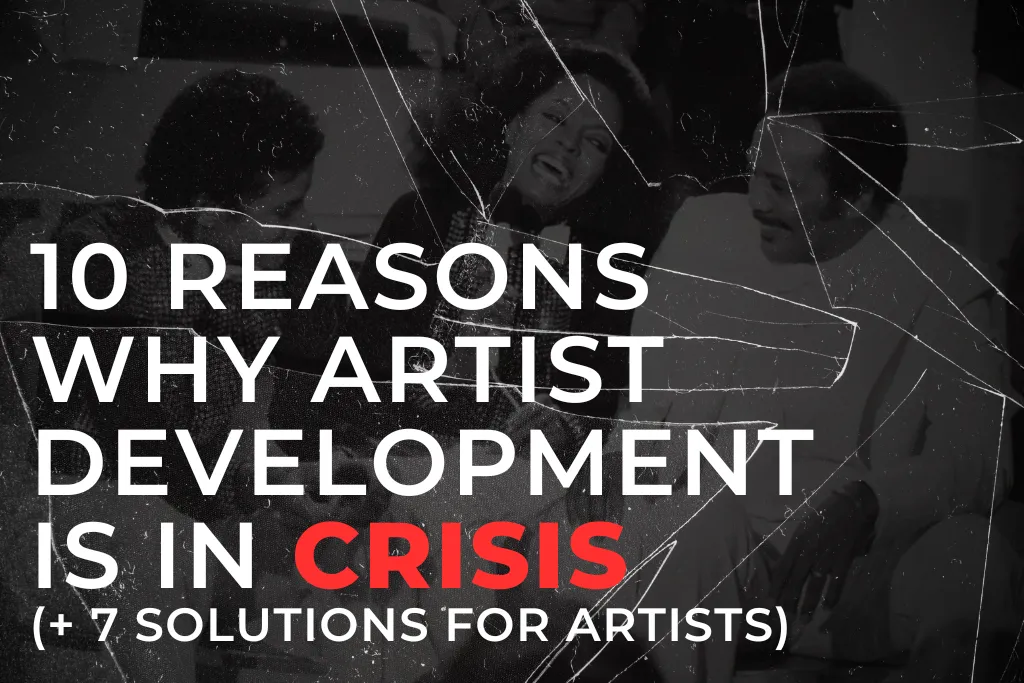I’m taking a risk writing this article. Why? Mostly because the title and concept of this article may rub some people the wrong way. And that’s okay. Because I’m sharing my authentic truth, and also want to help. And like Bob Lefsetz once said, “If everyone generally ‘likes‘ what you do, then you’re doing it wrong.” In other words, I need more haters.
So I came to the conclusion and concept to write this article (aka “We Need a Better You”) after hundreds of meetings with songwriters and producers. In these meetings, I’d ask the all-important question:
“What do you need the most help with right now as a songwriter?”
The top answer, hands down, is usually always the same: “I just need to get in better rooms.”
And I completely agree! (Stay with me here, though.). I should clarify that the reason this article might rub some people the wrong way is … surely, your manager or music publisher just needs to snap their fingers – pull some strings, do their job and get you (at whatever level you are at right now) into those better rooms.
This is indeed the goal. We all want that. We all want those “better rooms” to elevate not just your overall songwriting but also provide the best opportunities. And as I’ve been doing this type of “leveling up” over 30 years for my clients, I’ve come to some non-obvious conclusions.
And leveling up your associations and relationships – the circles you rub shoulders with, your work colleagues – should always be the path, no matter if you’re a writer, producer, musician, artist, executive, or whatever that might be. To say it in another way…those who are in growth mode are usually the ones seeking to be the least smart or least talented person in the room.
And I’ll show you, in my opinion, how to be a better “you” and how that will result in better rooms.
But first, I have a key metaphor to show you how silly it is to just think that “getting in better rooms” is the heavenly (and I daresay entitled) answer for you getting to the next level of your career. “Better rooms” is not the entire answer. Not by a long shot.
The answer, really, is about “you” and improving yourself—so you can bring actual and true value to your co-writes and those upper tiered rooms for which you seek.
Let me illuminate a “better room” metaphor.
The Berklee College of Music “Ratings System”
At Berklee College of Music, where I attended as a dual major in songwriting and performance, they still have this rating system. Every student has a rating – and this rating tells you exactly where you fit in the Berklee hierarchy.
To get your infamous “rating,” you audition in front of an esteemed panel of professors. Usually the context here is a miniature jam session, based on a tune or standard you’ve prepared with a great ensemble of players. This also includes soloing and improvising etc. Afterward, this panel gives you a collective four-digit rating score, i.e. 7657 or 2223.
Each of the four digits ranges from 1-8 (8 being the best) with each of those four numbers rating your musicianship (i.e. technical skills, improvisation, sight-reading, overall musicality, etc.). For example, the very best players might have an 8778. If you’re just “pretty good” you might have a 4435. And if you’re nowhere on the map, you get “1’s” and “2’s.” Either way, a few days after the audition, you know EXACTLY (and I really mean exactly) where you stand in the Berklee system. Full stop.
And while a lot of musicians would grumble about how this is totally B.S. or how their audition went poorly, etc. – the empirical results are in. They are what they are.
Will you get “in the room” with your ratings? The Berklee College of Music (with gray skies, as usual!).
Now, why are these ratings important? At Berklee, for all ensembles and many classes, you can’t even get an audition for that ensemble unless you have a certain minimum level of rating. You simply do not have access to those ensembles (and consequently other musicians) until you’re “good enough” to even merit getting an audition or being in the room.
At Berklee, you wouldn’t even get to audition for this below ensemble with “6’s” (which is a really good score).
You see, you’re just not going to get in a level 7777 prerequisite ensemble, if you only have a 4564 rating. Full stop. Is that fair? I’d begrudgingly say, “Hell yes!” (And that’s acknowledging that I never got my scores better than “4’s.”) It turns out that, as a musician – I was just not good enough to be in that 5555 room. I can’t be bitter about it. I can’t say, “No one’s giving me a shot here,” or, “My manager didn’t have the connections,” etc.
So what do you do? You really want to get in that ensemble, but your scores are just not there. Does that mean you’ll never get in that room? Does that mean you just winge and say “the world’s not fair,” or make up some other lame excuses? Hell no! Because helloooooo…you can improve your scores. And you can do that casually – or you can play all out and work your ass off, so next semester you’re “in that room!”
That’s right—you do the work. You create your value. You “shed,” to use a Berklee term (I don’t know if that term is still in use, but it means you go to the “woodshed” aka the practice room, and you don’t come out until you’re the sh*t).
The Invisible Songwriting Rating System
Now, I think you know where this is going. There’s a perfectly strong correlation between that Berklee rating system and the “invisible songwriting rating system” in the professional songwriting and major-label community.
You want to be leveling up your collaborations…but at a certain point, if you don’t have the “ratings,” then you probably shouldn’t expect entrance into that room.
And what is this “invisible songwriting rating system” I speak of? This is going to be your accolades, cuts, hits, who you’re already working with, and the buzz you have on the co-writing scene. Yes, what’s the word on the street about you?
Now, this can be great, if amazing things are happening for you. If not – It is what it is. You’ll probably be in “new-songwriter purgatory” for a while – that is, until you actively level up and improve your “hotness” (for lack of a better word).
You see, just like our previous example – you can change your “songwriting rating.”
Now, sure, your publisher or manager (and even yourself) can indeed work for you, reach out, and get some really great collaborations going. But to really get in those elevated rooms – we need to embrace elevating wherever you are right now and getting to the next level.
And to improve – it’s absolutely not just about more random co-writes.
It’s absolutely not about writing more songs.
In fact, I’m going out on a limb here and say that – you probably should be writing…less!
I’ll say that again. To become a better writer, you should probably be writing LESS and doing more of the below.
In my opinion, while making your big hits and important songs and leveling up those rooms – you should also be focused on “doing the work.” This is so you can ultimately step into those “bigger rooms.”
The steps to getting in better songwriting rooms
So what is “doing the work?”
Let’s begin with expanding your songwriting vocabulary, learning those great songs that have come before you – internalizing them – and then modeling those hits! Yes, relentlessly finding out what makes those hits tick! At the same time, you need to be working on your songwriting and personal beliefs, identity, and mindset. (Check out all the free resources below at the end of this article for more.)
Now, because I know songwriters’ and artists’ mentality, a large number of you are reading this and saying. “That’s bullshit. I’m amazing. If only I got a co-write with XYZ artist or hitmaker, then they’d know how good I am. Just get me in the room.”
And here’s another one – maybe you’re saying to yourself, “Surely, there are shortcuts to get access and get in ‘better rooms’ right now.” In my opinion – yes and no.
One strategy (which admittedly sometimes works great – but often fails more than wins), is the following. An up-and-coming writer or producer signs to another producer or manager or music publisher / label who’s in the slipstream of hits, where this writer (in theory) can easily be inserted into projects and better rooms. And yes! When this works – it’s great. It’s actually awesome. But sometimes – these writers are just not ready yet. Or it’s just not a fit at all. They get in that bigger room, they get the opportunity – but just can’t deliver the goods. And after a few sessions – they’re just not invited back into those rooms and even worse, they’re often not getting the attention they signed up for in the first place. This is called being stuck.
Berklee Ratings vs Invisible Songwriting Ratings
That equivalent scenario, to use a Berklee ensemble metaphor, is somehow, someone pulled some strings for you…and now you’re in that really high level 7777 ensemble with your 4543 score – and guess what? After one song, everyone knows you don’t belong there. And you’re not getting invited back.
But how about this scenario? Let’s say your rating is a 7567. That, along with your passion, persistence, personality and likability, and how you “show up,” plus a little luck, gets you in that 7777 ensemble. And even better, even though you weren’t quite ready, you get a pass – because of who you are. You’re bringing value. You believe you should be there. And being in that 7777 ensemble levels your game up. That’s right…iron sharpens iron!
That’s a great growth win!
And that’s what we want to do as a publisher. We want to get you in those rooms that are achievable, and more advanced – even just a little more from where you are right now. Internally at my company, this is what we call “level ups.” At the same time, we also practice making some “big leaps” – because, hey, you just never know.
But look, the point of this article is that no matter who you are and where you are right now in your career path:
Yes, we want a “better you” – so that getting in those rooms will just be a natural and easy byproduct of who you are and who you’ve decided and earned to become.
Make sense?
That’s what I’m talking about when it comes to “getting in better rooms.” You have to build value for yourself. You have to get better credits and buzz (you know the “invisible songwriting ratings” system). You need to BRING VALUE to the room – full stop!
So how do we do that? How do we create a better you?
I’ll give you a hint. As mentioned before – it’s not just about writing more songs (with your limited songwriting vocabulary). That’s just called spinning your wheels. Nor is growth doing more co-writes with other songwriters and producers who have the same “song ratings” as yourself.
However, if you just want to be in a perpetual cycle of mediocrity – I would say that is indeed a f*cking awesomely good plan. It’s also what most people do.
No, it’s about doing “the work.” Yes, doing the work that most people don’t believe is worth doing today – and fortunately for you, this is probably 95% of most writers and artists. The good news is you can be part of the 5% who are doing the work, giving you the unfair advantage.
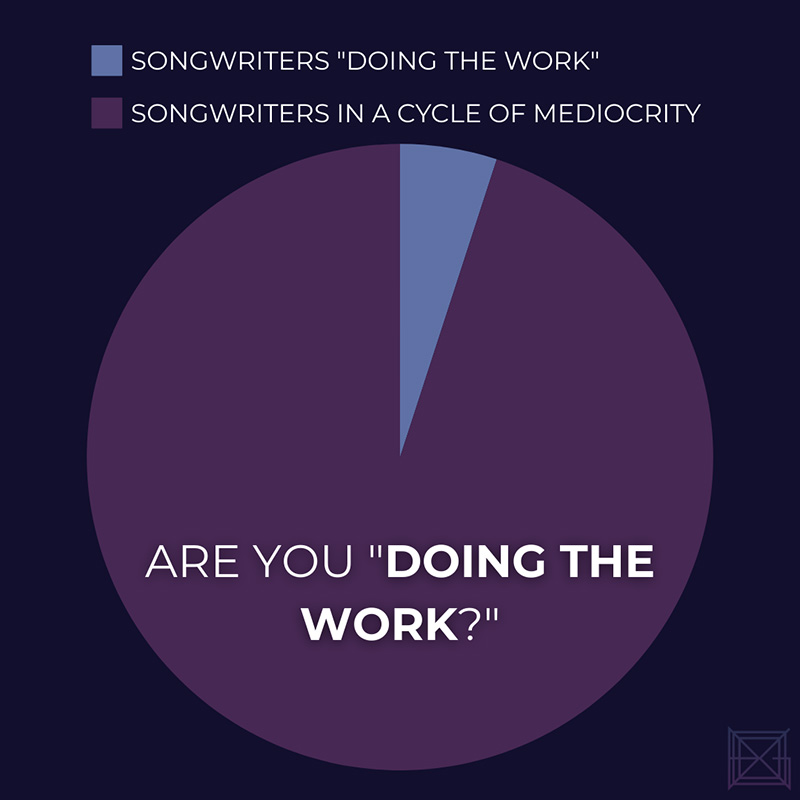
Are you doing the work?
Now, to circle back to the original “music publisher” question from the beginning of this article: “What do you need the most help with right now?”
Never in hundreds of meetings with songwriters and artists has anyone ever said: “I need help with elevating my songwriting vocabulary, learning from the best historical writers, finding a mentor, elevating my personal and self-growth. And when it comes to what I believe is possible for myself regarding my personal beliefs, identity, self-worth, and mindset – completely elevating my game.”
Bingo!
Most people don’t realize this is a key question to be asking. And that’s okay! Because we can’t expect you to know what you don’t know. But hey, now you know!
So finally, let me share, in my opinion, some systems, a curriculum and how to “do the work” that creates a “better you,” attracting those “bigger rooms,” bigger co-writes and bigger songs.
In fact, I’ve already written extensively about this. And in my own career – I have done the work. And I’m continuing to do it all the time.
So today, I just get to just “link out” to previously written articles, which I’ve detailed below.
But I felt I needed to give you the lay of the land before “going there.”
But even better, I recommend you sign up for and take my songwriting mastery course, “The Hit Songwriter Accelerator,” where I fully dive into all these topics over 6+ hours of content, and over 50 modules on “you” becoming a better you.
The Songwriting Vocabulary Expander

Unpacking The Songwriting Vocabulary Expander in “The Hit Songwriter Accelerator.”
First, let’s talk about The Songwriting Vocabulary Expander. I came up with that term and this concept of an ever-expanding songwriting vocabulary universe for you to implement. The full article is here: https://www.benjamingroff.com/blog/songwriting-vocabulary-expander-how-to-become-one-of-the-best.
The concept is the following: Most songwriters and artists achieve a standard point of musicality and song knowledge. And by how? Learning other songs. That’s perfect. However, at a certain point they start writing their own material. Great. However, the mistake in a songwriter’s growth is often – they stop actively learning those great songs, further analyzing what truly makes a song great.
In other words – they get a fourth-grade songwriting vocabulary – and that’s about it. They plateau.
You see, to become the best, you need to continually be studying and “standing on the shoulders of giants.” You should be dissecting, analyzing, internalizing, and modeling the great songs that have come before you.
It’s time to expand your hit songwriting vocabulary, so that you understand how great songs and hits operate. It’s very likely that you’re “not yet” speaking this hit song language. So learn it! It’s there waiting for you.
The equivalent here is saying you want to speak conversational twelth-grade French but you’re only willing to put in the work to learn to operate at a fourth-grade reading material…and sure, that’s fine if you want to just get by.
Let me put it another way. Would you like a songwriting lesson today with Prince? Story time. It turns out that Max Martin is/was obsessed with Prince. I’m sure he knows and can play and has studied all of Prince’s hits. It’s just a guess. But the takeaway is – if you want a songwriting lesson with Prince – you can have one. Right now! Just spend the next month learning everything about Prince’s songs and what makes them tick. Dissect them. Analyze them. Internalize them. Model them. Then, add that knowledge to your “songwriting spellbook.”
Yes! Your spellbook! Do you think a great wizard like Dr. Strange (or Gandalf) just shows up and utters some “random magical words” like, “Alazabakabra supernova exteronomous,” and then magic happens? Hell no! A great wizard has a vast library filled with thousands of tomes, both ancient and new. Gandalf from The Lord of the Rings or Dr. Strange are the best wizards because they’ve studied the most and know the best and most powerful spells!
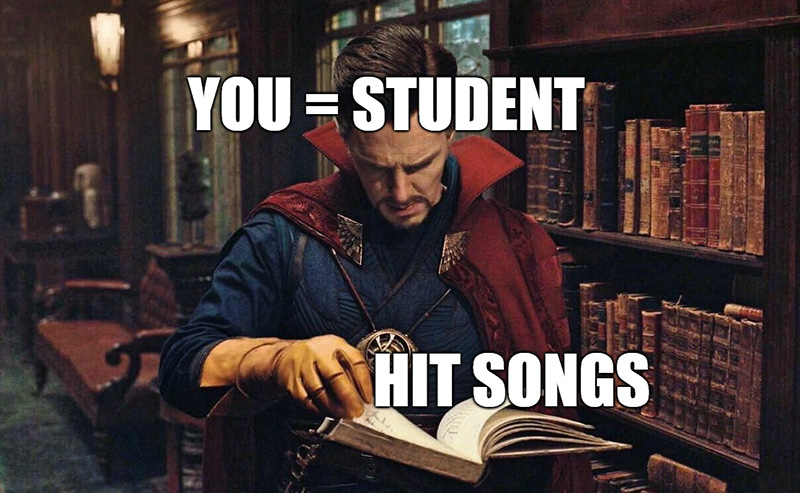
Your success is most likely linked to your songwriting vocabulary.
Make no mistake – songwriters ARE wizards, who conjure magic out of thin air.
Expanding your songwriting vocabulary and doing this on a consistent daily basis is where it’s at.
And for all of you that are reading this and are like, “Thanks but no thanks…I’m just going to continue writing and recycling my own tired stuff,” please take note and enter Michael Pollack.
Michael Pollack is notably one of the biggest hitmakers on the planet right now. And I would presume, without doubt – that he knows his stuff. Backwards and forwards. He has a fantastic songwriting vocabulary. And you know what? I don’t even know Michael Pollack personally. But how could I surmise such a statement? Just check out this video of Michael during his younger years via Vanderbilt University, asking the iconic Billy Joel if he can play “New York State of Mind” with him.
You know what? I would bet that Michael Pollack is a walking songbook of hundreds of hits, which he could play at any time. That’s just a guess.
So let me ask you – what songs have you studied today, this week, this year?
Doing “the Work” on Yourself and Self-Improvement
The above video clip is also a great example of someone’s “belief system.” Again, it’s just a guess here, but Michael believed he could play with the legendary Billy Joel onstage, right then, at that moment. And then…he asked!!! And it happened!
We’re talking about your identity, your beliefs, including getting rid of (or muting) your limiting beliefs, and your negative (or at the very best unempowering) personal or songwriting “stories” you’ve made up about yourself.
These are your stories that might be – and probably are – completely false, yet they drive your existence. This is all about your personal belief and your mindset of what’s possible for you. And if you want to learn more about this, I actually have several hours dedicated to the topic and smashing through to the next level in “The Hit Songwriter Accelerator” course. But no worries – if you go to the end of this article, I’ve provided four free articles on this subject.
But let’s keep unpacking this. To quote one of my own coaches, Nick Cownie, in his opinion: 95% of success is based on your identity, beliefs, and mindset. 5% is attributable to your actual skills.
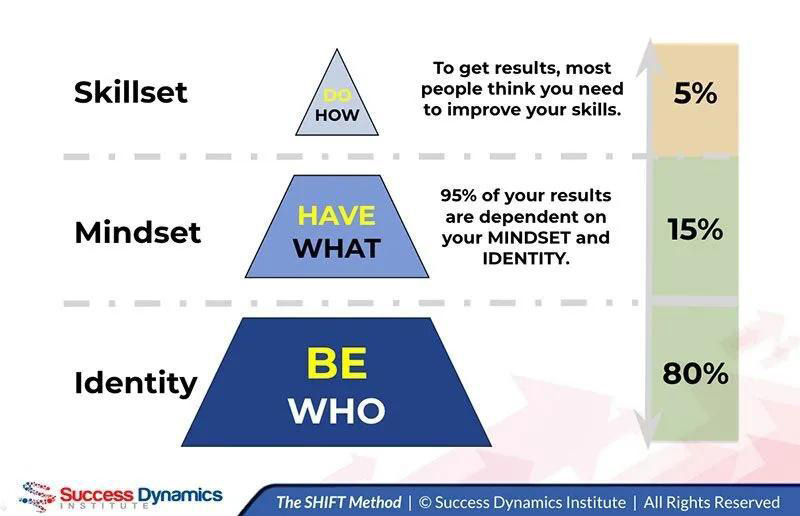
Courtesy of my awesome coach, Nick Cownie
Think about the above and consider if it could be true. The above means that regardless of your skills and how good of a songwriter you might be, if you have a negative belief system about yourself, or you don’t see yourself as a successful songwriter, or if your self-worth doesn’t align with your belief in achieving success, then you’re just fighting an uphill battle. Even worse – to quote Gay Hendricks from his amazing book “The Big Leap” – you might end up achieving great success and then, “upper-limiting” yourself. Why? Because deep down inside – you don’t believe you deserve it or it conflicts with your personal belief system (or whatever your story is going on).
We need everything to be congruent here so you can have the wind to your back and flow with the stream instead of against it. In other words, let’s get yourself out of the way.
I’m also going to say something controversial here. This is especially important for creative people, songwriters, and artists.
You see, not many of us grew up innately with personal stories and scripts like, “I’m a winner,” “I’m the f*cking best.” “I’m good enough,” “I’m so hot,” etc. In other words, I don’t know many captains of the football team and/or homecoming queens who turned out to be deep, culture-shifting music artists. No. It’s more of the outcasts, introverts, and troubled youths that are the important voices in our musical world.
And that’s okay. That’s where “doing the work” comes in. Because if those silent “limiting belief” programs and stories, self-talk, etc. aren’t addressed, we often can just be swimming against the current. I mean – how would it feel if you could just drop all that extra baggage (including anxiety)… and voila, that two-ton weight you’ve been dragging around is gone? How much easier would it be to achieve your goals? And yes, in case you were wondering, this also certainly includes therapy.
Damn, if only I had this knowledge in my 20s.
On that note, I have several resources for you to dive into right now, today, and start making significant changes in these areas. Trust me when I say that this is some of the most important work you can do – working on yourself.
Disclaimer of course, I’m not a certified psychologist or anything of the sort (though I am a certified Flow State Coach).
The below is what I’ve uncovered on my own personal journey – and I’m happy to share what I’ve learned along the way – modified and re-presented from the view of a songwriter or artist’s point of view.
Benjamin’s Recommended Resources
Create Your New Songwriter Story: The Stories We Tell Ourselves: https://www.benjamingroff.com/blog/create-your-new-songwriter-story/
The Hero’s Journey as a Songwriter or Artist (AKA Growth Is What Happens Between Your Sessions): https://www.benjamingroff.com/blog/heros-journey-as-a-songwriter-artist/
Forget Skills! Your Path to Success = Mindset, Belief, and Identity With Nick Cownie: https://www.benjamingroff.com/blog/how-to-create-mindset-belief-and-identity-for-your-career-success
How To Create & Manifest Your Hit Songwriting Future: https://www.benjamingroff.com/blog/create-and-manifest-your-hit-songwriting-future
“Breaking the Habit of Being Yourself” by Dr. Joe Dispenza: https://amzn.to/3J49Ywg

This is the #1 book I recommend to change your life right now, along with Dr. Joe’s associated meditations.
In summary, yes, your publisher, manager, and team all need to elevate you and get you into better opportunities.
Better rooms = Better opportunities = Better royalty checks and H I T S!
We all want that!
But we also need a better you. Investing in yourself, making you a better “you” with all the extra value we talked about! And of course – this won’t happen overnight.
But if not, now? When? When are you going to start?!
Remember, this is the type of work you should be doing (in my opinion) via a daily routine, if you expect and want to have a career that lasts for decades. And even more importantly, achieve your goals faster. That’s right.
I will say one last thing here as an observation: How much time are you bouncing around from co-write session to session? How many songs are you writing per week? How much time are you spending looking and chasing that “shiny object.”
Remember when I suggested that to achieve your goals and get into those bigger rooms, it might be likely you need to be writing less? So, here’s the question:
For most people reading this, I’d say that number is zero.
And that’s truly sad to me. Because 95% of all songwriters and artists simply don’t have a curriculum of self-improvement, nor do they really know about it.
Here’s an epiphany.
That’s right – instead of chasing “better rooms,” you need to chase a better YOU!
Now, it could be that you’re just innately a songwriting genius and have everything firing on all cylinders. And that’s great! But I’ll also say in the hundreds of hitmakers and Grammy award-winners I’ve worked with – I just don’t know anyone within that upper-tier level who didn’t put in “the work.”
So what to do?
Start right now and develop a curriculum focused on your personal growth in these areas. Yes, it’s going to be work. Yes, it’s going to be challenging. Yes, you’re going to think, “What if I don’t have time for that?” But trust me, you’ll make the time. And it’s going to be f*cking amazing when you start achieving your goals, leveling yourself up, writing those big songs, getting those hits, and, you got it… getting in those bigger rooms.
And how did you do that? How did you get in those bigger rooms?
You became a better you.
Just think: Where do you think you’ll be as a songwriter or artist in a month, a year, or five years from now following this type of growth?
To be one of the best, the answer lies in “doing the work” – the work that most people don’t think is important in the first place. That’s what brings value – your value. And that’s what you get paid for.
And now, my songwriting friend, you have the answers to start your journey.
So what you gonna do?
